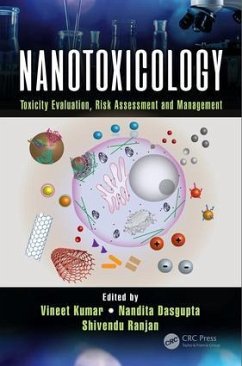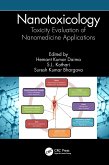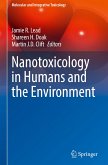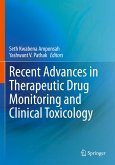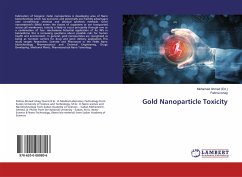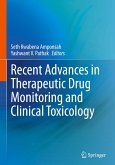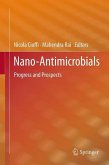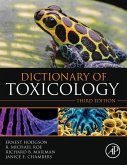Nanotoxicology
Toxicity Evaluation, Risk Assessment and Management
Herausgeber: Kumar, Vineet; Ranjan, Shivendu; Dasgupta, Nandita
Nanotoxicology
Toxicity Evaluation, Risk Assessment and Management
Herausgeber: Kumar, Vineet; Ranjan, Shivendu; Dasgupta, Nandita
- Gebundenes Buch
- Merkliste
- Auf die Merkliste
- Bewerten Bewerten
- Teilen
- Produkt teilen
- Produkterinnerung
- Produkterinnerung
The future of nanomaterials in electronics, mechanical, medical and various other industries depends up on how accurate are our nanotoxicity testing protocols and safety guidelines. This book focuses on causes and prevention of nanotoxicity induced by various nanoproducts. This book describes all these aspects of nanotoxicity critically in detail. This edited book contains five sections describing the basic principles, trends, challenges and future directions of nanotoxicity. Further, the limitations and challenges of current toxicity testing and future scope of toxicity testing of nanomaterials are discussed in detail.…mehr
Andere Kunden interessierten sich auch für
![Nanotoxicology Nanotoxicology]() Nanotoxicology214,99 €
Nanotoxicology214,99 €![Nanotoxicology in Humans and the Environment Nanotoxicology in Humans and the Environment]() Nanotoxicology in Humans and the Environment113,99 €
Nanotoxicology in Humans and the Environment113,99 €![Recent Advances in Therapeutic Drug Monitoring and Clinical Toxicology Recent Advances in Therapeutic Drug Monitoring and Clinical Toxicology]() Recent Advances in Therapeutic Drug Monitoring and Clinical Toxicology151,99 €
Recent Advances in Therapeutic Drug Monitoring and Clinical Toxicology151,99 €![Gold Nanoparticle Toxicity Gold Nanoparticle Toxicity]() Fatima IshagGold Nanoparticle Toxicity18,99 €
Fatima IshagGold Nanoparticle Toxicity18,99 €![Recent Advances in Therapeutic Drug Monitoring and Clinical Toxicology Recent Advances in Therapeutic Drug Monitoring and Clinical Toxicology]() Recent Advances in Therapeutic Drug Monitoring and Clinical Toxicology151,99 €
Recent Advances in Therapeutic Drug Monitoring and Clinical Toxicology151,99 €![Nano-Antimicrobials Nano-Antimicrobials]() Nano-Antimicrobials151,99 €
Nano-Antimicrobials151,99 €![Dictionary of Toxicology Dictionary of Toxicology]() Ernest HodgsonDictionary of Toxicology68,99 €
Ernest HodgsonDictionary of Toxicology68,99 €-
-
-
The future of nanomaterials in electronics, mechanical, medical and various other industries depends up on how accurate are our nanotoxicity testing protocols and safety guidelines. This book focuses on causes and prevention of nanotoxicity induced by various nanoproducts. This book describes all these aspects of nanotoxicity critically in detail. This edited book contains five sections describing the basic principles, trends, challenges and future directions of nanotoxicity. Further, the limitations and challenges of current toxicity testing and future scope of toxicity testing of nanomaterials are discussed in detail.
Produktdetails
- Produktdetails
- Verlag: CRC Press
- Seitenzahl: 704
- Erscheinungstermin: 26. März 2018
- Englisch
- Abmessung: 240mm x 161mm x 42mm
- Gewicht: 1209g
- ISBN-13: 9781498799416
- ISBN-10: 1498799418
- Artikelnr.: 51810806
- Herstellerkennzeichnung
- Libri GmbH
- Europaallee 1
- 36244 Bad Hersfeld
- gpsr@libri.de
- Verlag: CRC Press
- Seitenzahl: 704
- Erscheinungstermin: 26. März 2018
- Englisch
- Abmessung: 240mm x 161mm x 42mm
- Gewicht: 1209g
- ISBN-13: 9781498799416
- ISBN-10: 1498799418
- Artikelnr.: 51810806
- Herstellerkennzeichnung
- Libri GmbH
- Europaallee 1
- 36244 Bad Hersfeld
- gpsr@libri.de
Vineet Kumar is currently working as Dr DSK postdoctoral fellow in the Department of Chemistry, Panjab University Chandigarh, UT India. He has worked in different areas of biotechnology and nanotechnology in various institutes and universities namely, CSIR-Institute of Microbial Technology, Chandigarh, U.T., India, CSIR-Institute of Himalayan Bioresource Technology, Palampur, H.P. India and Himachal Pradesh University, Shimla, H.P. India. His areas of interest include green synthesis of nanoparticles, nanotoxicity testing of nanoparticles and application of nanoparticles in drug delivery, food technology, sensing, dye degradation and catalysis. He has published many research articles in these areas featuring in peer-reviewed journals. Nandita Dasgupta is currently serving as Research Associate at VIT University, Vellore, Tamil Nadu, India. She has exposure of research institutes and industries including CSIR-Central Food Technological Research Institute, Mysore, India and Uttar Pradesh Drugs and Pharmaceutical Co. Ltd., Lucknow, India. Her areas of interest include toxicological analysis, natural products technology, nanobiotechnology and agri-food technology. She has published many scientific articles in international peer reviewed journals and also serving as editorial board member and referee for reputed international peer reviewed journals. She has received Elsevier Certificate for "Outstanding Contribution" in Reviewing from Elsevier, The Netherlands. She has also been nominated for Elsevier advisory panel for Elsevier, The Netherlands. She was the Guest Editor in Journal of Chemistry for the special issue entitled "Food Nanotechnology Opportunities and Challenges". Shivendu Ranjan is currently working as DBT-Research Fellow, Department of Biotechnology, Ministry of Science and Technology, Govt of India at VIT University, Vellore, Tamil Nadu, India. He is also serving for a non-government organization as an Honorary-Director, Research Wing, Veer Kunwar Singh Memorial Trust, Chapra, Bihar, India. He is the Founder-Director at Xpert Arena Technological Services Pvt. Ltd., India (www.xpertarena.com); this company is dedicated to serve in online and offline sectors with a vision to simplify the education. He has also founded and drafted the concept for first edition of "VIT Bio Summit" in 2012 and the same has been continued till date by the university. His area of research is multidisciplinary which are as but not limited to: Nano-food technology, Nano-agri technology, Nanobiotechnology, Nano-toxicology, Natural products technology, Natural products chemistry, Bio-business, Food chemistry and Food Engineering. He has published many scientific articles in international peer reviewed journals and also serving as editorial board member and referee for reputed international peer reviewed journals.
Introduction to Nanotoxicity: Historical Overview of Nanotechnology in
Context to Nanotoxicity. Nanomaterials and Environment. Safety Aspects of
Nanomaterials Used in Foods, Drugs, Cosmetics and Other Iindustries. Ethics
in Nanotechnology and Society Perception. Factors Affecting Toxicity of
Nanomaterials: Impact of Physiochemical Properties and Surface Chemistry of
Nanomaterials on Toxicity. Effect of Route of Nanomaterial Exposure on
Toxicity of Nanomaterials. Effect of Test Dose on the Nanomaterials
Toxicity. Influence of Test Model Selection on Nanotoxicity Evaluation.
Nanotoxicity to Environment and Living Organism: Interaction of
Nanomaterials with Biological Matrices. Toxic Effect of Nanomaterials to
Environment. Interaction of Nanomaterials with Animal Cell Lines: in vitro
Studies. Nanotoxicity Evaluation Using Experimental Animals: in vivo
Studies. Influence of Nanomaterials on Human Health. Toxic Effect of
Nanomaterials to Plants and Beneficial Soil Bacteria. Methods of
Nanotoxicity Evaluation: Methods for in vitro and in vivo Animal
Nanotoxicity Evaluation. In vitro and in vivo Nanotoxicity Evaluation in
Plants. Nanotoxicological Evaluation in Water and Marine Organisms.
Pharmacokinetics Approach for Nanotoxicity Evaluation. Genomic Approach in
Nanotoxicity Evaluation. In silico Methods for Nanotoxicity Evaluation.
Sensors for Toxicity Evaluation of Nanomaterials. Regulatory Guidelines and
Future Risk Assessment Strategies in Nanotoxicity: Guidelines and Protocols
for Nanotoxicity Evaluation. Regulations for Safety Assessment of
Nanomaterials. Minimizing Nanotoxicity with Green Chemistry. Improving
Nanotoxicity Evaluation Via the Use of miRNA, siRNA and Stem Cell Studies.
Challenges, Recommendations and Strategies for Nanotoxicity Evaluation and
its Management.
Context to Nanotoxicity. Nanomaterials and Environment. Safety Aspects of
Nanomaterials Used in Foods, Drugs, Cosmetics and Other Iindustries. Ethics
in Nanotechnology and Society Perception. Factors Affecting Toxicity of
Nanomaterials: Impact of Physiochemical Properties and Surface Chemistry of
Nanomaterials on Toxicity. Effect of Route of Nanomaterial Exposure on
Toxicity of Nanomaterials. Effect of Test Dose on the Nanomaterials
Toxicity. Influence of Test Model Selection on Nanotoxicity Evaluation.
Nanotoxicity to Environment and Living Organism: Interaction of
Nanomaterials with Biological Matrices. Toxic Effect of Nanomaterials to
Environment. Interaction of Nanomaterials with Animal Cell Lines: in vitro
Studies. Nanotoxicity Evaluation Using Experimental Animals: in vivo
Studies. Influence of Nanomaterials on Human Health. Toxic Effect of
Nanomaterials to Plants and Beneficial Soil Bacteria. Methods of
Nanotoxicity Evaluation: Methods for in vitro and in vivo Animal
Nanotoxicity Evaluation. In vitro and in vivo Nanotoxicity Evaluation in
Plants. Nanotoxicological Evaluation in Water and Marine Organisms.
Pharmacokinetics Approach for Nanotoxicity Evaluation. Genomic Approach in
Nanotoxicity Evaluation. In silico Methods for Nanotoxicity Evaluation.
Sensors for Toxicity Evaluation of Nanomaterials. Regulatory Guidelines and
Future Risk Assessment Strategies in Nanotoxicity: Guidelines and Protocols
for Nanotoxicity Evaluation. Regulations for Safety Assessment of
Nanomaterials. Minimizing Nanotoxicity with Green Chemistry. Improving
Nanotoxicity Evaluation Via the Use of miRNA, siRNA and Stem Cell Studies.
Challenges, Recommendations and Strategies for Nanotoxicity Evaluation and
its Management.
Introduction to Nanotoxicity: Historical Overview of Nanotechnology in
Context to Nanotoxicity. Nanomaterials and Environment. Safety Aspects of
Nanomaterials Used in Foods, Drugs, Cosmetics and Other Iindustries. Ethics
in Nanotechnology and Society Perception. Factors Affecting Toxicity of
Nanomaterials: Impact of Physiochemical Properties and Surface Chemistry of
Nanomaterials on Toxicity. Effect of Route of Nanomaterial Exposure on
Toxicity of Nanomaterials. Effect of Test Dose on the Nanomaterials
Toxicity. Influence of Test Model Selection on Nanotoxicity Evaluation.
Nanotoxicity to Environment and Living Organism: Interaction of
Nanomaterials with Biological Matrices. Toxic Effect of Nanomaterials to
Environment. Interaction of Nanomaterials with Animal Cell Lines: in vitro
Studies. Nanotoxicity Evaluation Using Experimental Animals: in vivo
Studies. Influence of Nanomaterials on Human Health. Toxic Effect of
Nanomaterials to Plants and Beneficial Soil Bacteria. Methods of
Nanotoxicity Evaluation: Methods for in vitro and in vivo Animal
Nanotoxicity Evaluation. In vitro and in vivo Nanotoxicity Evaluation in
Plants. Nanotoxicological Evaluation in Water and Marine Organisms.
Pharmacokinetics Approach for Nanotoxicity Evaluation. Genomic Approach in
Nanotoxicity Evaluation. In silico Methods for Nanotoxicity Evaluation.
Sensors for Toxicity Evaluation of Nanomaterials. Regulatory Guidelines and
Future Risk Assessment Strategies in Nanotoxicity: Guidelines and Protocols
for Nanotoxicity Evaluation. Regulations for Safety Assessment of
Nanomaterials. Minimizing Nanotoxicity with Green Chemistry. Improving
Nanotoxicity Evaluation Via the Use of miRNA, siRNA and Stem Cell Studies.
Challenges, Recommendations and Strategies for Nanotoxicity Evaluation and
its Management.
Context to Nanotoxicity. Nanomaterials and Environment. Safety Aspects of
Nanomaterials Used in Foods, Drugs, Cosmetics and Other Iindustries. Ethics
in Nanotechnology and Society Perception. Factors Affecting Toxicity of
Nanomaterials: Impact of Physiochemical Properties and Surface Chemistry of
Nanomaterials on Toxicity. Effect of Route of Nanomaterial Exposure on
Toxicity of Nanomaterials. Effect of Test Dose on the Nanomaterials
Toxicity. Influence of Test Model Selection on Nanotoxicity Evaluation.
Nanotoxicity to Environment and Living Organism: Interaction of
Nanomaterials with Biological Matrices. Toxic Effect of Nanomaterials to
Environment. Interaction of Nanomaterials with Animal Cell Lines: in vitro
Studies. Nanotoxicity Evaluation Using Experimental Animals: in vivo
Studies. Influence of Nanomaterials on Human Health. Toxic Effect of
Nanomaterials to Plants and Beneficial Soil Bacteria. Methods of
Nanotoxicity Evaluation: Methods for in vitro and in vivo Animal
Nanotoxicity Evaluation. In vitro and in vivo Nanotoxicity Evaluation in
Plants. Nanotoxicological Evaluation in Water and Marine Organisms.
Pharmacokinetics Approach for Nanotoxicity Evaluation. Genomic Approach in
Nanotoxicity Evaluation. In silico Methods for Nanotoxicity Evaluation.
Sensors for Toxicity Evaluation of Nanomaterials. Regulatory Guidelines and
Future Risk Assessment Strategies in Nanotoxicity: Guidelines and Protocols
for Nanotoxicity Evaluation. Regulations for Safety Assessment of
Nanomaterials. Minimizing Nanotoxicity with Green Chemistry. Improving
Nanotoxicity Evaluation Via the Use of miRNA, siRNA and Stem Cell Studies.
Challenges, Recommendations and Strategies for Nanotoxicity Evaluation and
its Management.

